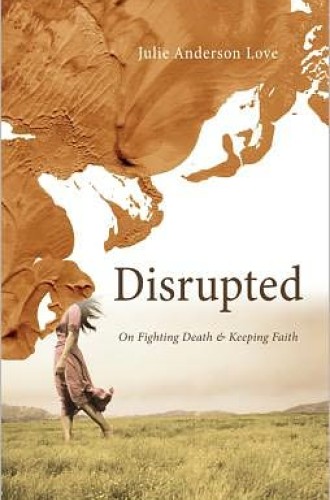Disrupted, by Julie Anderson Love
On her first of many stays in the hospital for treatment of an aggressively malignant pineal blastoma, Julie Love returned to her room to find an eight-foot banner that read "Hope And Prosperity." Her head was bandaged from the surgery that had revealed the alarming extent of a sprawling tumor that had "a death grip" on her brain, branching into areas the neurosurgeon wouldn't risk entering. Ironic as the banner might seem in her situation, it had particular significance: a friend had pointed out that the root word of prosperity is hope—sperare—suggesting that biblical promises of prosperity perhaps have more to do with the gift of hope than with material blessing. The same friend had also come upon the Latin phrase dum spiro spero—"while I breathe, I hope"—and had linked those meanings to a life guided by the Holy Spirit: pro spiritus.
As it turned out, the months that followed her bleak diagnosis in 1994, filled with cycles of pain, nausea, disorientation, dizziness, radiation, chemotherapy and uncertainty, were also a time of deep learning about hope. Love, a 29-year-old associate pastor in a Portland church, whose husband was finishing his dissertation and embarking on his own career in theology, learned quickly that hope has nothing to do with passivity. She was, as she described it later, "the patient from hell." She asked questions until she got answers. She argued with the neurosurgeon and with God. On one of the monthly three-day hospital stays that were becoming routine, she seized the evening hours before nausea set in to sneak out for beer and pizza with a few willing collaborators. She had every intention of surviving but no time for the kind of compliance that involved forfeiting her sense of how to do that.
Read our latest issue or browse back issues.
The story she tells in the ensuing chapters takes full account of the difficulties, discouragements and minor irritations, as well as the surges of faith, gratitude and insight, and the continuous love she experienced over her months of treatment. The narrative is fast-paced, episodic, lively, quirky and colloquial, giving readers a startling sense of the sort of piety that develops in the lively questioning mind of a youthful woman determined to believe only in a God who is willing to meet her in the dark nights and hold her while she wrestles.
Love chose her own equipment for those encounters with God and for the arduous journey during which they occurred: Job for his insistent questions; Jacob for his wrestling and his wound; Frederick Buechner; a few Buddhists; Madeleine L'Engle. And Anne of Green Gables because Anne's world "was an entire star system away from mine. There I could breathe; there was nothing to fear at Green Gables."
In the face of radical uncertainty, Love discovered both her strength and her brokenness: "An unanswered question breaks you," she writes. "All preconceived notions no longer hold. It is a hurricane ripping away all that is not nailed down. A wind that whips your house to shreds, leaving only the fireplace and an old shoe. A necktie hanging from a tree. My tumor was an unanswered question."
Answers came intermittently and partially from two exceptional neurosurgeons, from a friend who had lost her husband to cancer, from the unhappy diversion of losing her position in a church she had hoped would see her through her sickness, from Buechner and the writings of Buddhists, from hymns that played in her head at night and from recurrent fury that stilled into new stages of acceptance. Her husband held her, her friends visited her and her faith proved resilient, but even in the midst of such faithfulness she learned, paradoxically, the importance of taking nothing for granted. Because everything is a gift, from birth onward.
"Many friends and family members are quick to declare me a miracle," Love writes, "But what do they mean by that?" To think of her own remarkable survival in that way loads it with theological significance, and that, she points out, puts a lot of pressure on God to clarify why one person's life is preserved and not another's. And it puts pressure on her to identify and get on with whatever special purpose she was presumably saved to accomplish. Miracle is not a term she uses lightly. Still, in her reflections on the unfolding story of her unlikely healing, she recognizes the hand of an inscrutable God whose breath and being infuse the shifting communities of people who find themselves, sometimes in spite of themselves, scaling a mountain together.
The final chapter in the book is a sermon Love preached in 2003 at the church that terminated her contract at what had seemed just the worst time. The understanding and forgiveness it took for her to return there did not come quickly. Just as she freely admits to other dark feelings, she fully acknowledges the bitterness she carried for months after the termination. When forgiveness came, it came as a gift that released her into another kind of healing.
The sermon opens with Buechner's account of a Genesis story: "The place to start is with a woman laughing"—Sarah laughing at God's promise of descendants. Then Love recalls Mary's response to Gabriel: "How can these things be?" In the remainder of the sermon she reflects richly on the double negative of Gabriel's answer, "Nothing will be impossible with God"—a slightly but significantly different construction from the oft-cited version of that assurance, that all things are possible to God. The double negative acknowledges the very real experience of impossibility—of what seem and sometimes are absolute roadblocks and dead ends, of refusals and persistent perplexities. Love's miracle is not, at that point, her cure alone.
Having been told unambiguously that she would be unable to bear children, in the aftermath of treatment she found herself pregnant. Months later she gave birth to a healthy daughter.
So her story continues. Her hearing is impaired. She walks slowly and carefully. She lives with the cloud of possible recurrence. But still, she is a woman who laughs.






